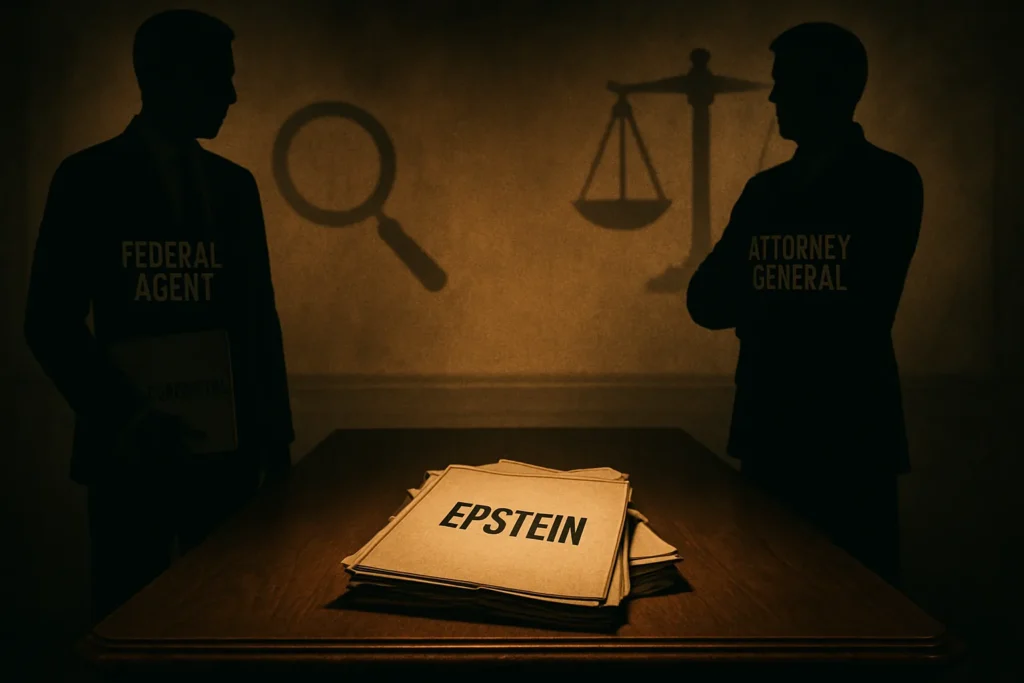Dispute Erupts at White House Meeting
FBI Deputy Director Dan Bongino found himself at the center of controversy following a heated disagreement with Attorney General Pam Bondi during a recent White House meeting. The dispute reportedly centered on the Justice Department’s handling of files related to Jeffrey Epstein, the disgraced financier who died by suicide in his New York jail cell in 2019. Central to the confrontation was a 10-hour surveillance video from outside Epstein’s cell, cited by the administration as evidence supporting the official finding that Epstein was not murdered. Sources indicated that Bongino personally reviewed the footage and publicly asserted it conclusively demonstrated no foul play involvement.
Following the passionate debate, Bongino was notably absent from work the following day, prompting speculation about his continuing role in the FBI. Despite this conspicuous absence, the administration has reaffirmed that Bongino remains employed at the bureau, attempting to dispel rumors of resignation.
“The deputy director was understandably upset and took personal leave following the thorough debate,” stated one senior official familiar with the dispute. “But he continues to hold his office and responsibilities.”
Laura Loomer, a recognized figure within Trump-supporting circles known for her promotion of conspiracy theories, reported that Bongino had become “furious” over Bondi’s management of the Epstein files. Loomer’s claim contributed significantly to the mounting speculation about internal rifts within the administration. Bongino’s absence, while brief, was widely noticed and highlighted tensions that have previously simmered beneath the surface.
Administration Denies Existence of Epstein Client List
The public disagreement highlights broader issues surrounding the Epstein controversy, especially regarding alleged high-profile connections to Epstein. The Justice Department and the FBI jointly issued a memo affirming that no client list associated with Epstein existed, nor was there credible evidence supporting claims of blackmail involving prominent figures. This joint statement provoked backlash from certain conservative factions who have repeatedly asserted claims of a cover-up designed to protect influential individuals.
Deputy Attorney General Todd Blanche dismissed allegations of any serious rift between FBI and DOJ leadership over this issue, publicly labeling such suggestions as “patently false.” Blanche, who previously served as a defense attorney for former President Donald Trump, stated that all senior leaders, including Bongino, signed off on the joint memo.
However, skepticism persists among critics, particularly among MAGA loyalists. The perceived lack of transparency and the administration’s categorical denial of a client list have not succeeded in quelling public skepticism or ending conspiracy theories. Some of these theories continue to gain traction among groups who previously supported Trump, raising concerns from officials within the White House and prompting further internal debates.
“Allegations of internal division and cover-ups continue to distract from efforts to maintain clear messaging,” a senior White House advisor lamented. “We need to move beyond conspiracies and focus on facts.”
Historical Context and Ongoing Implications
Jeffrey Epstein’s case has consistently fueled widespread public scrutiny and controversy since his initial arrest on federal sex trafficking charges in July 2019. Epstein’s subsequent death under suspicious circumstances generated numerous conspiracy theories, questioning the official narrative of his suicide. High-profile associations with Epstein—including documented friendships with prominent politicians, business leaders, and celebrities—have heightened the intrigue and speculation surrounding potential hidden truths.
The ongoing tensions between the FBI and Department of Justice regarding investigative disclosures are not without precedent. Historically, interagency disagreements on high-profile cases have frequently led to internal friction. Yet, the current controversy has renewed calls for improved transparency and accountability, especially given the sensitive nature of Epstein’s alleged crimes and connections.
The implications of this dispute may significantly affect public trust in federal institutions like the FBI and DOJ. If high-ranking officials publicly clash or resign, it could amplify perceptions of internal disarray or misconduct. These trust issues are especially pertinent during a politically polarized period, as any perceived administrative concealment or mismanagement may further erode faith in national law enforcement and the justice system.
Moreover, Bongino’s future within the FBI has become a symbolic battleground for vocal Trump supporters. Should Bongino resign or be reassigned in the wake of this dispute, it may invigorate factions already critical of the current administration’s handling of sensitive information.
As officials and the public grapple with the Epstein case’s legacy, the insistence on transparency remains fervent among advocacy groups and bipartisan congressional representatives. These stakeholders continue lobbying intensely, demanding comprehensive disclosures and concrete policy reforms to address questions raised by Epstein’s controversial life and death. Until authorities sufficiently address these widespread concerns, the Epstein controversy promises to remain a significant and contentious part of the American political and social landscape.


